Sir John Monash, Personal Files Book 12, 2 May - 31 May 1916, Part 4
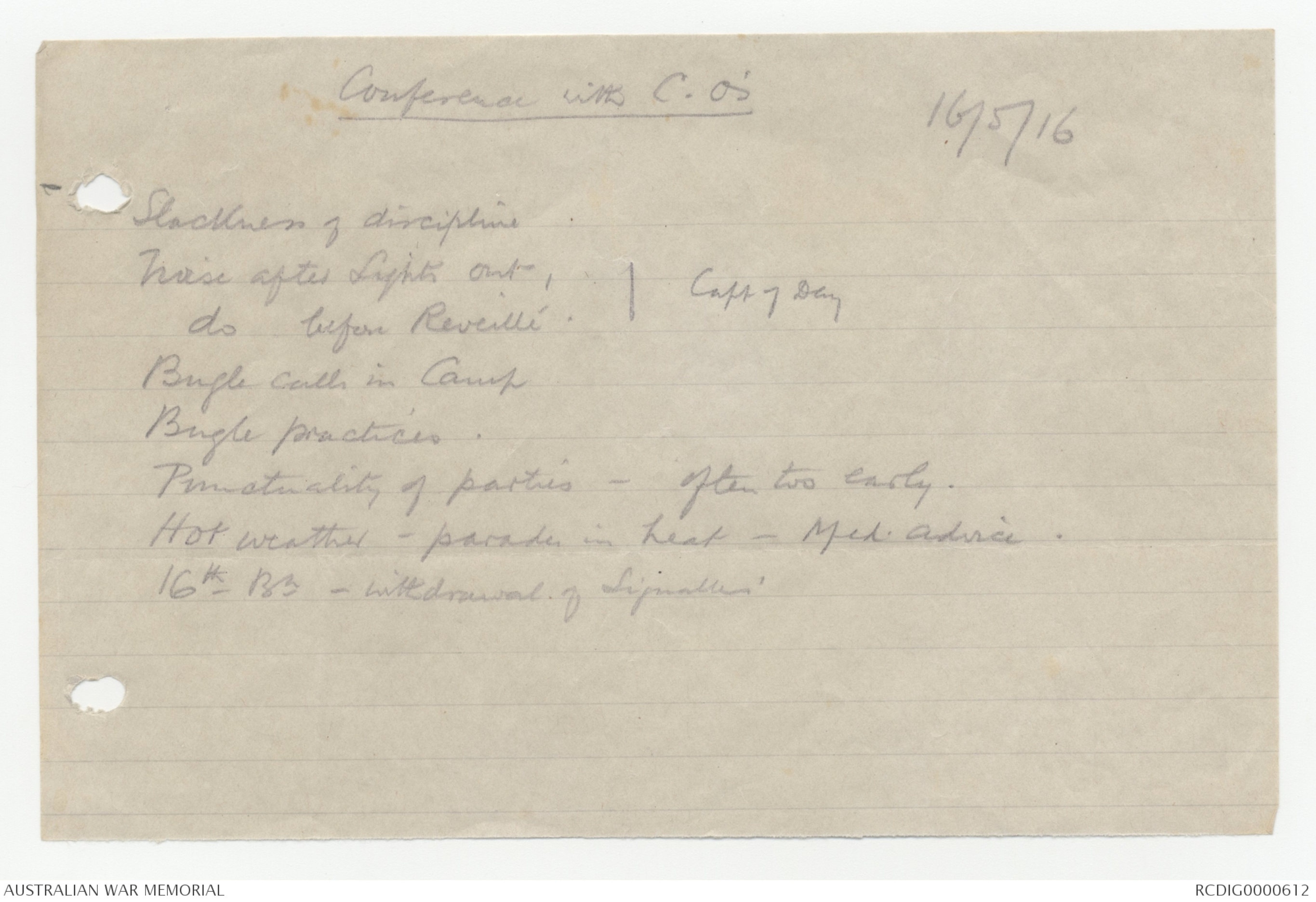
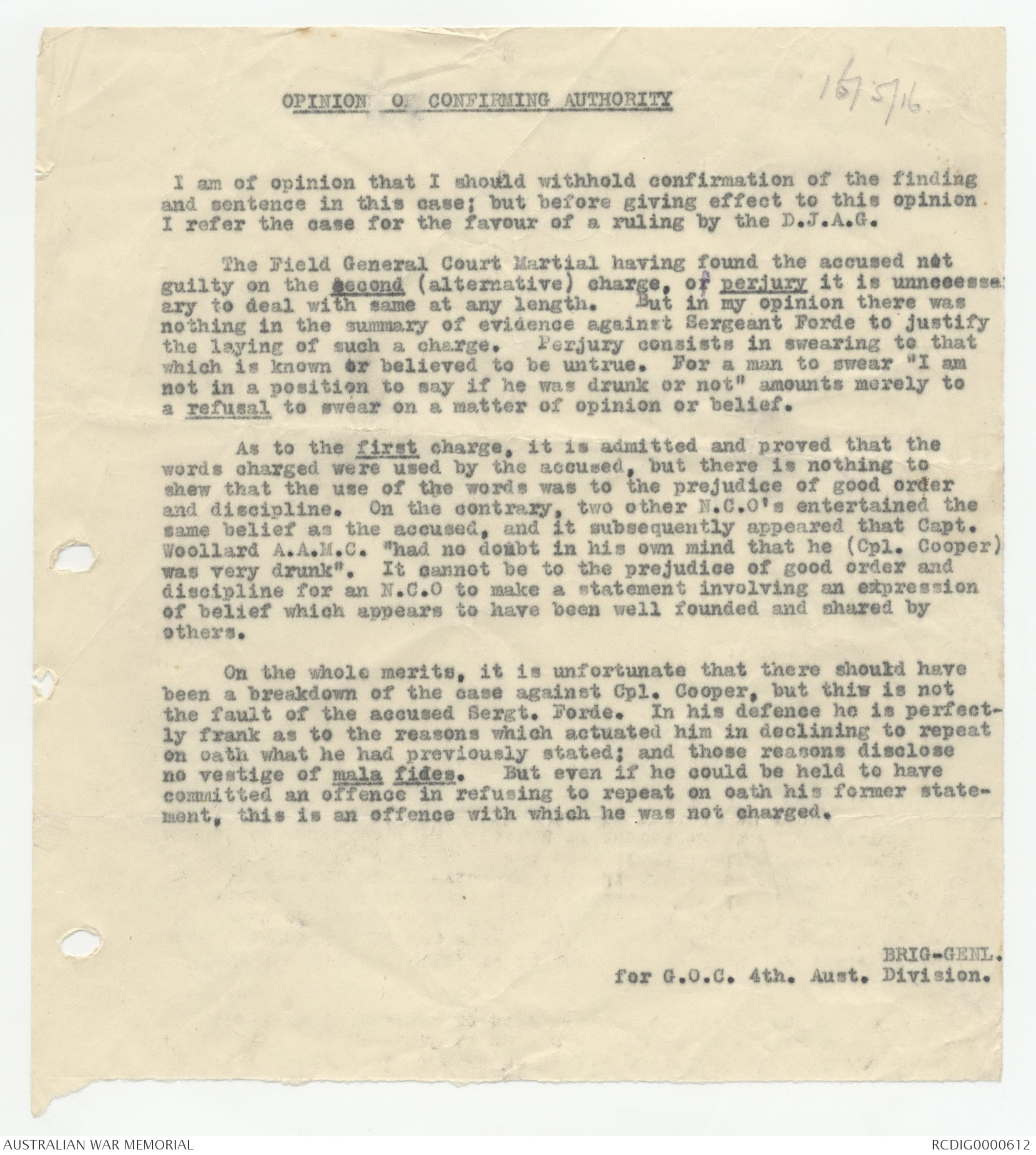
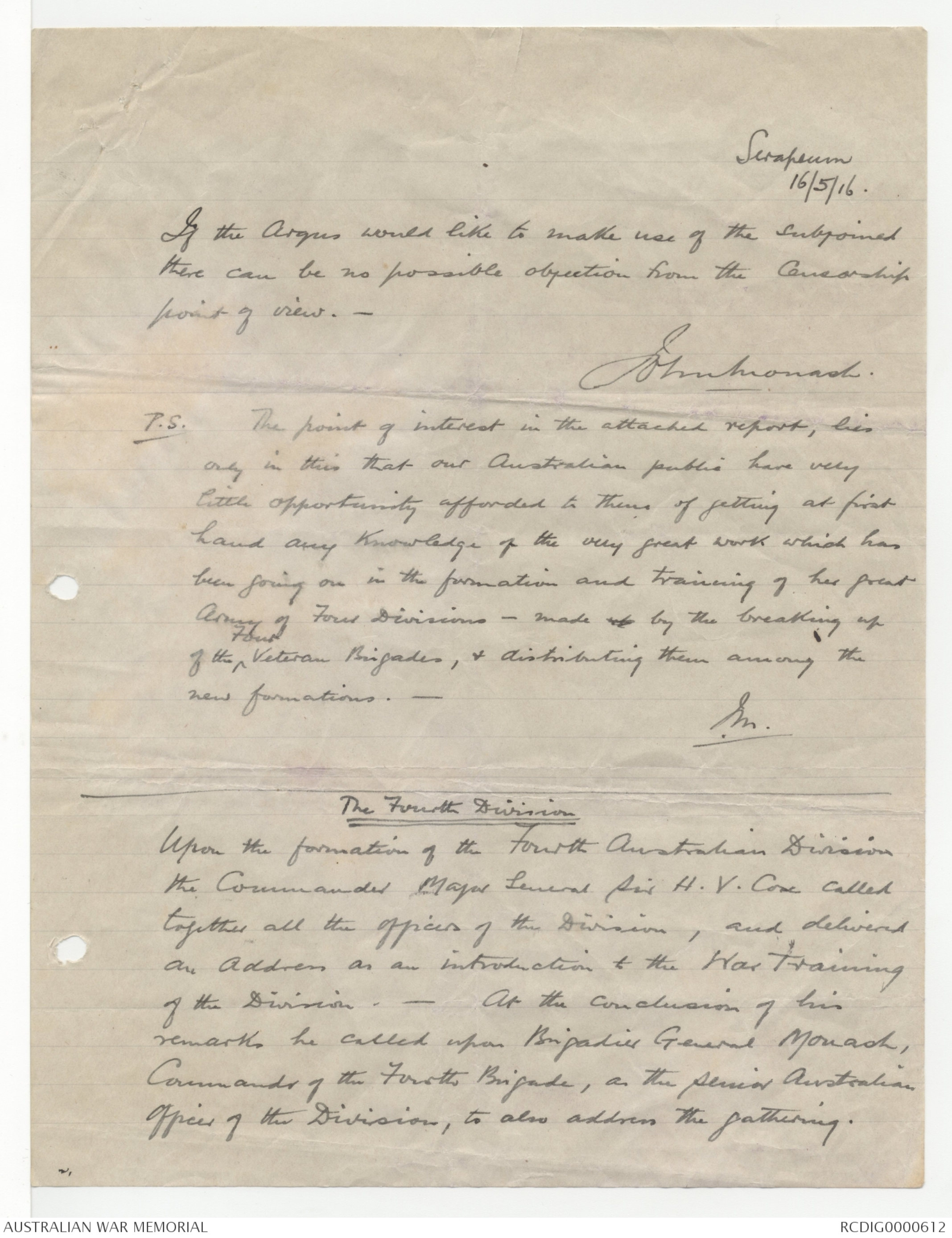
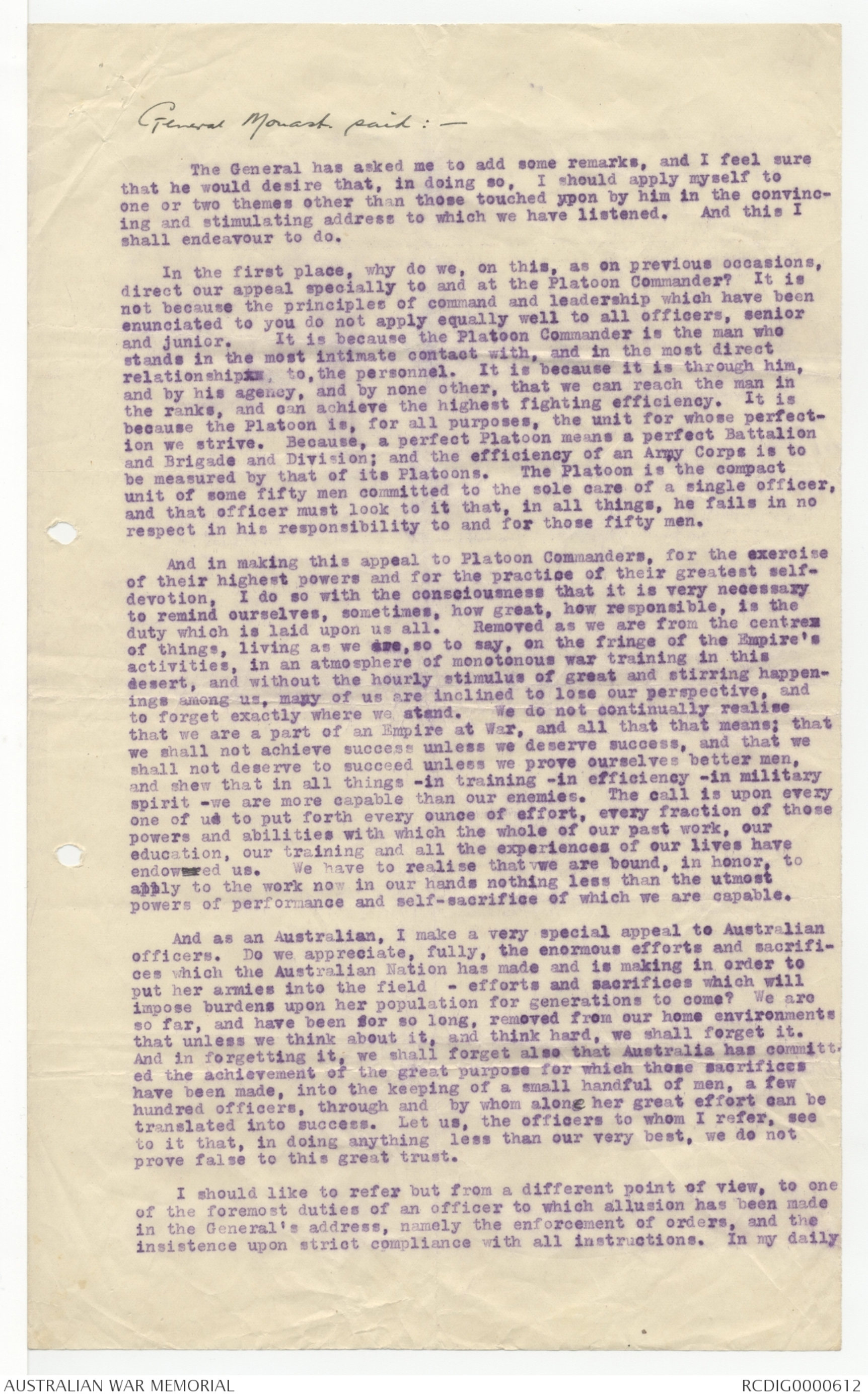
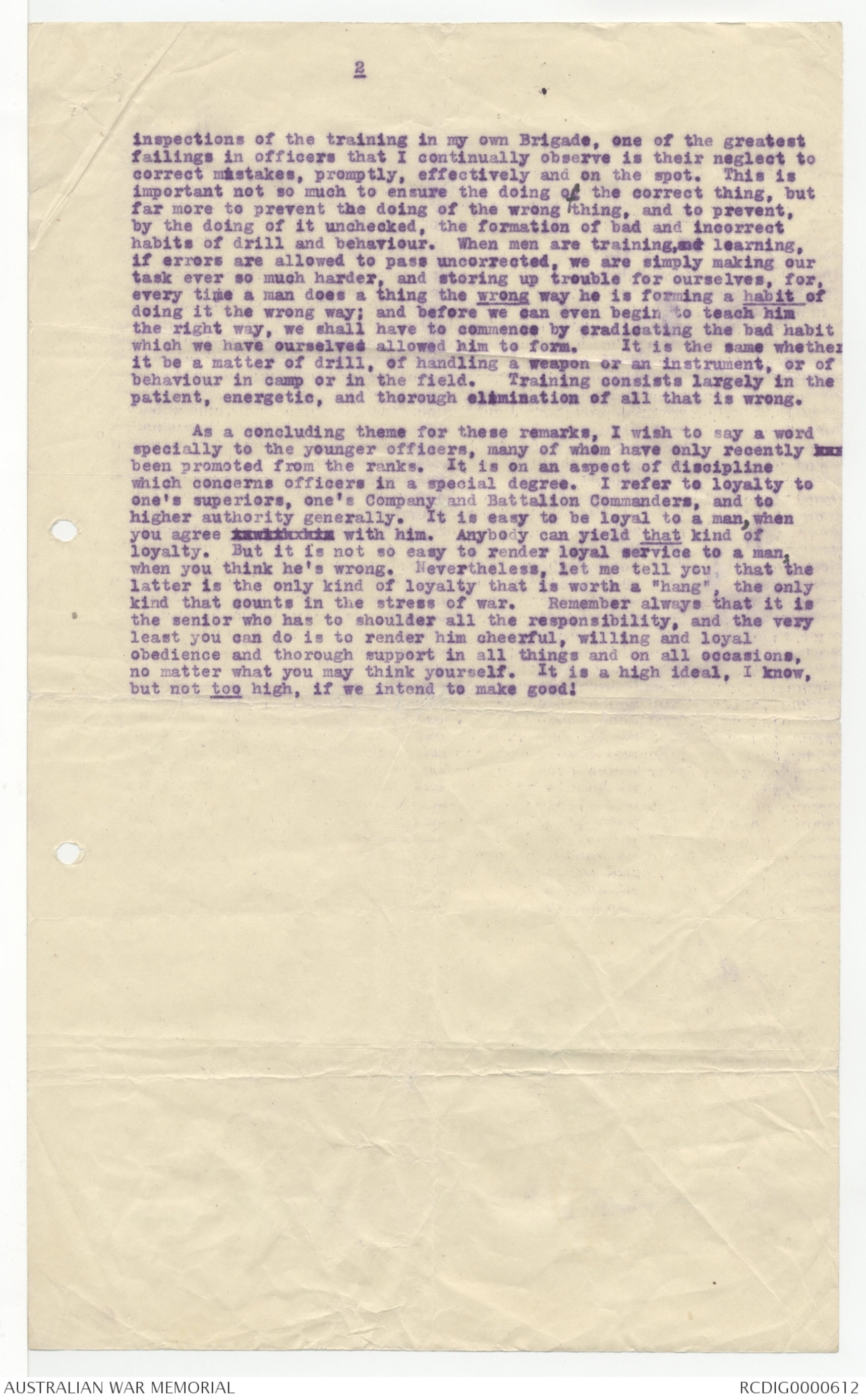
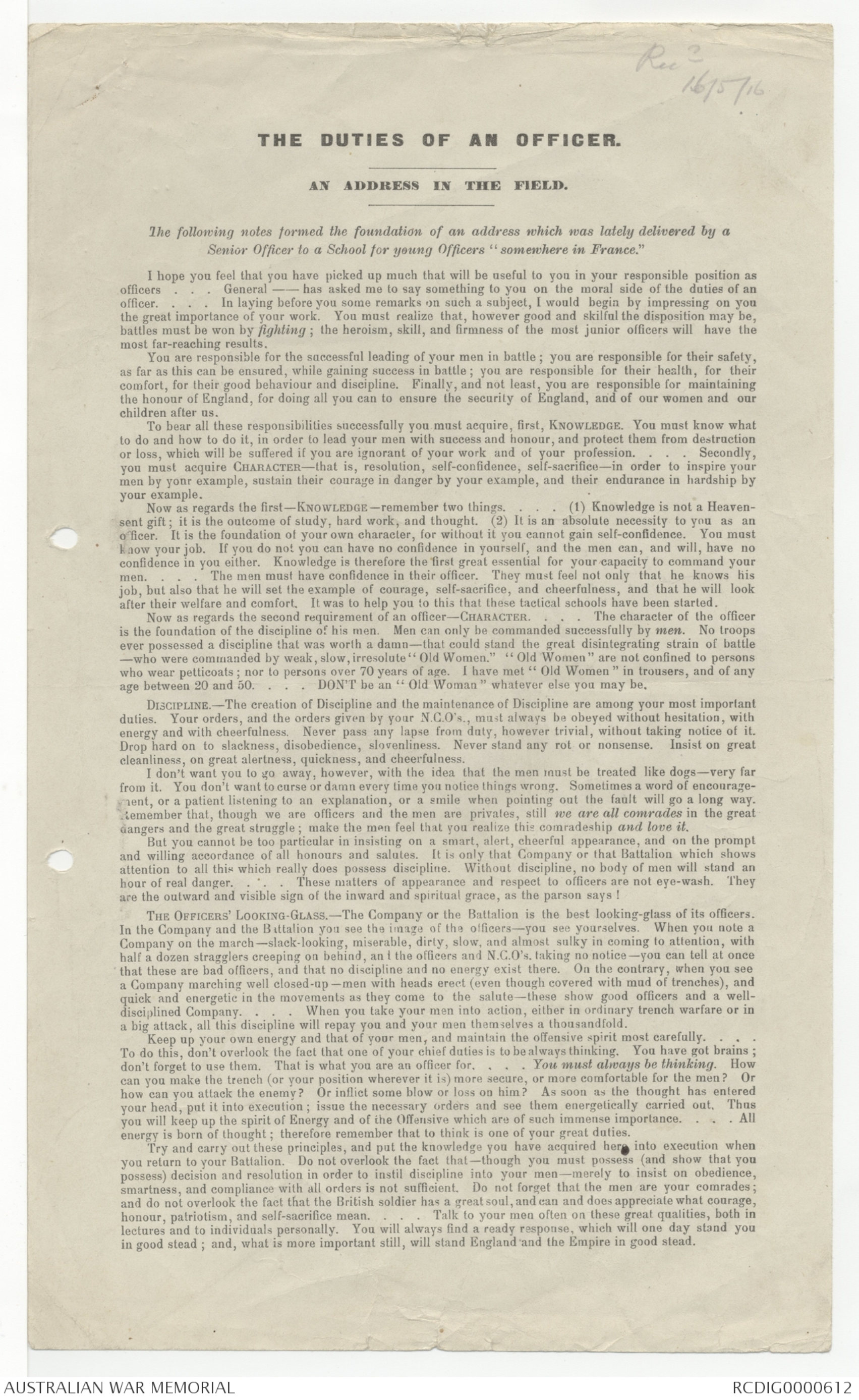
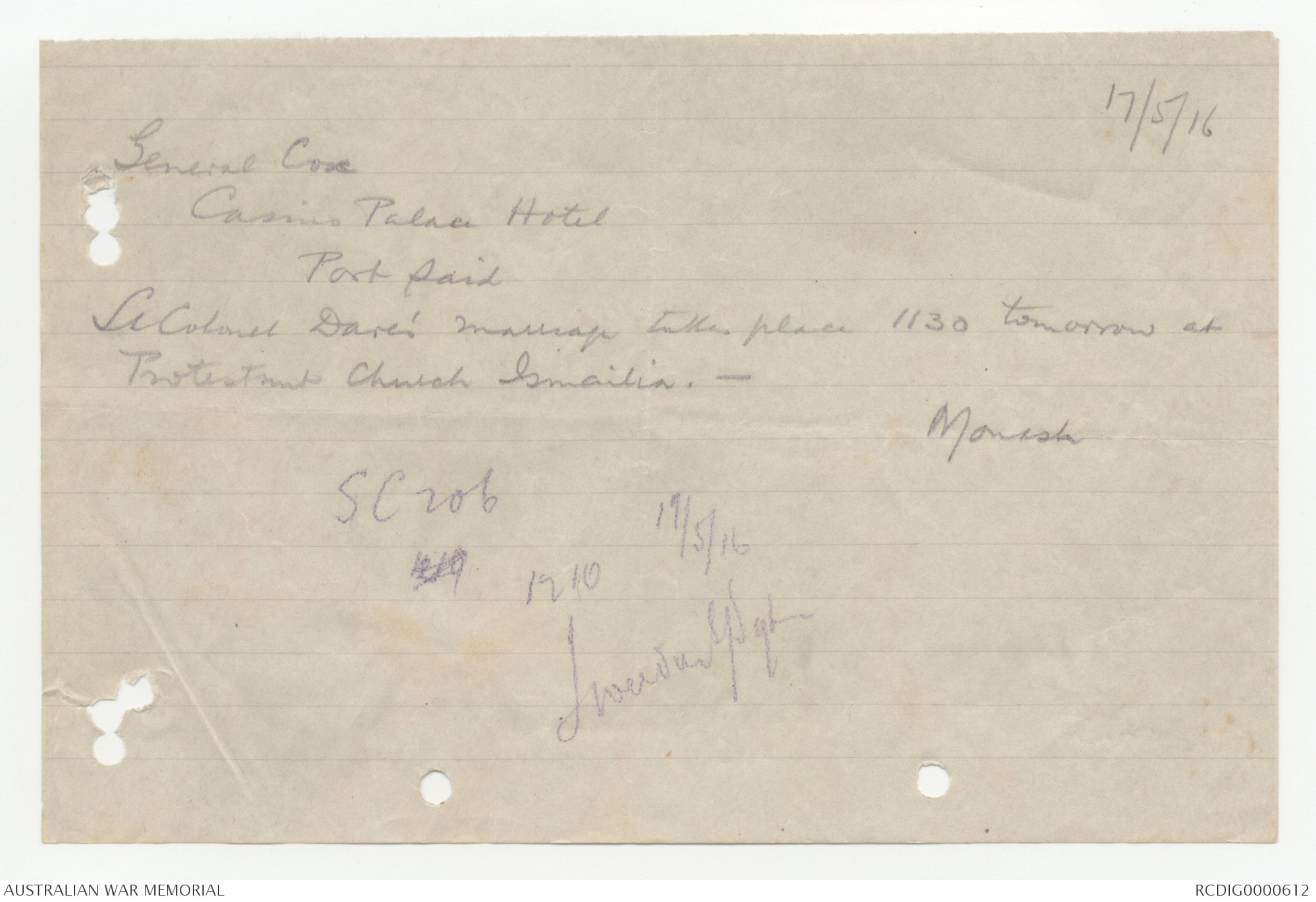
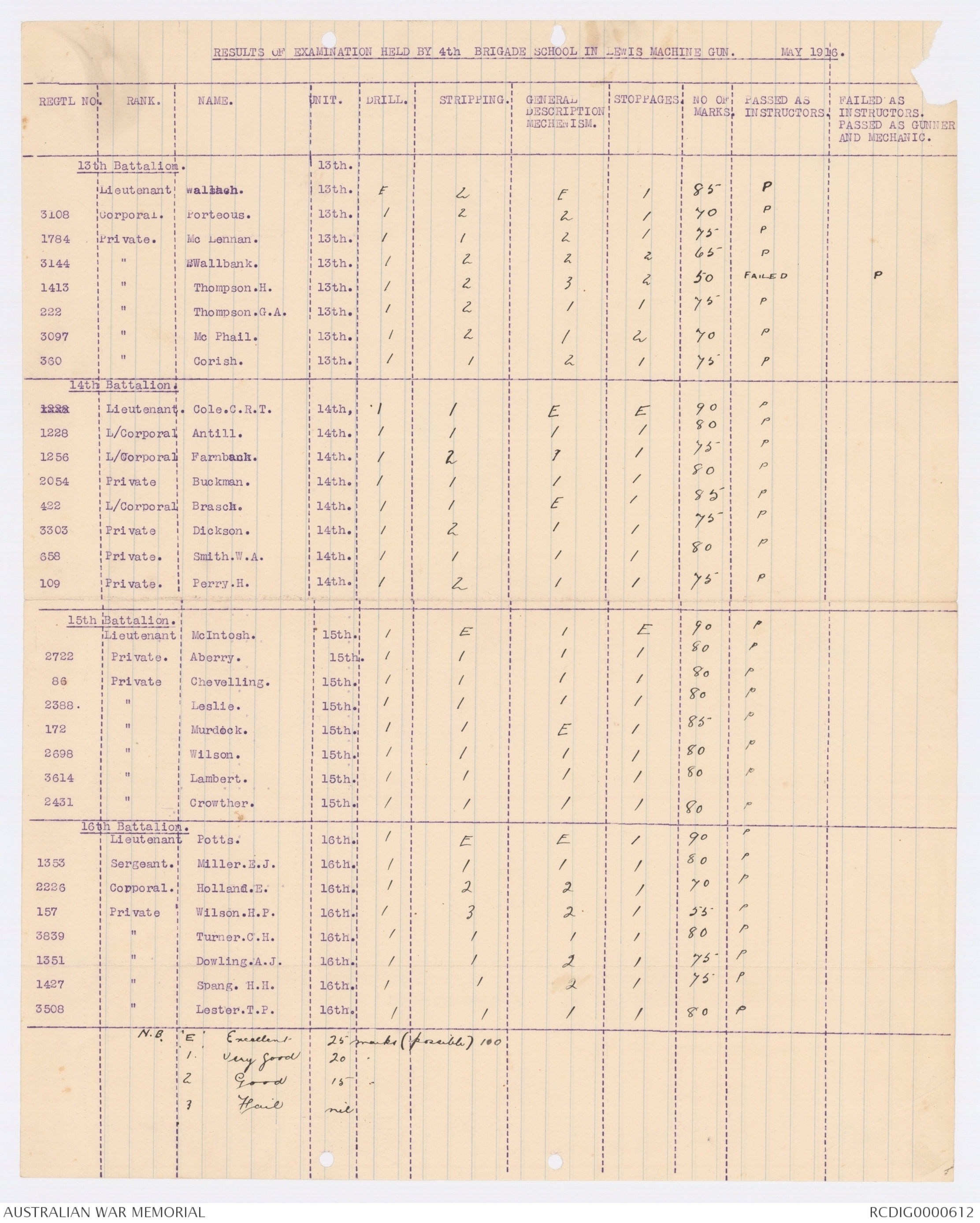
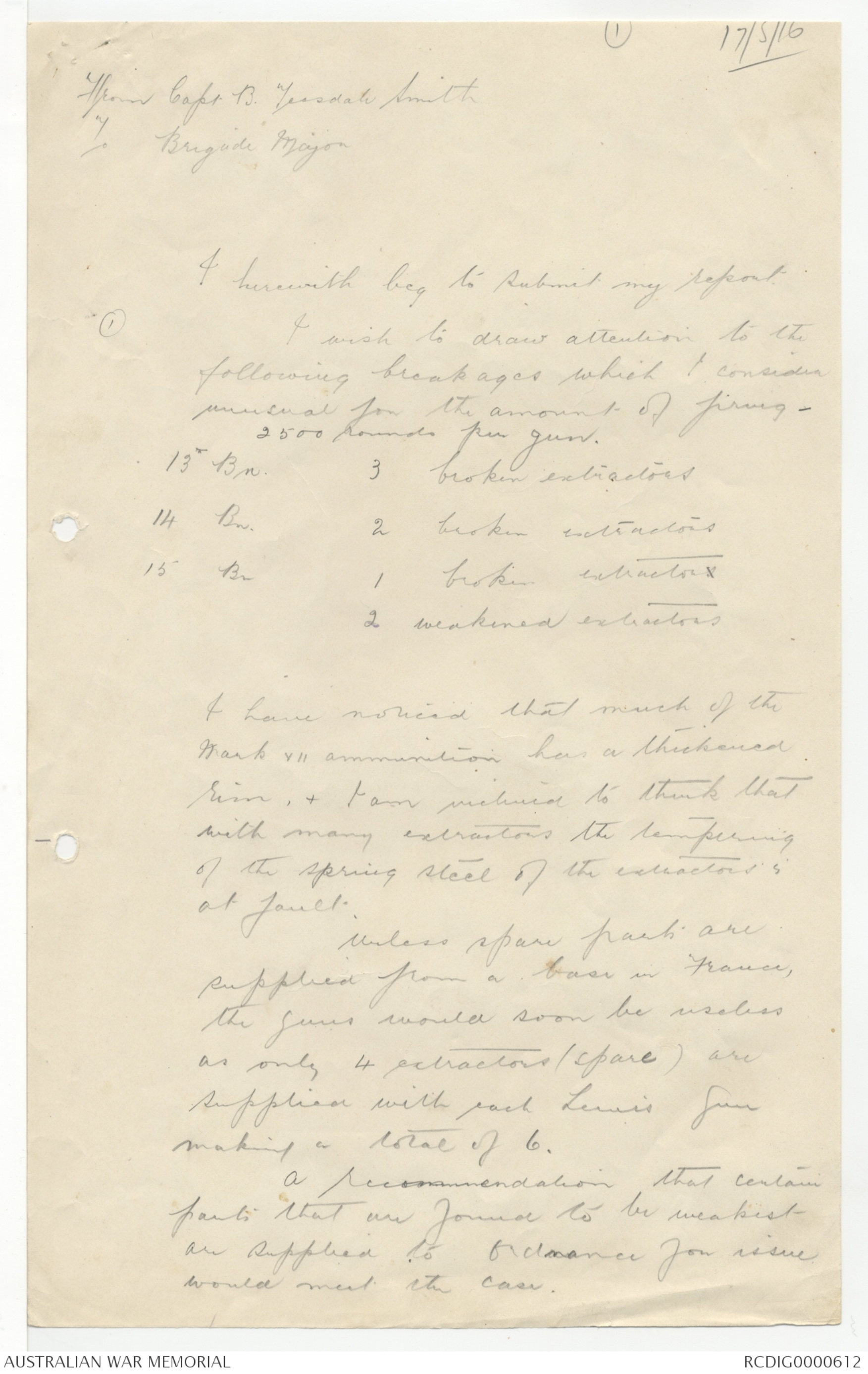
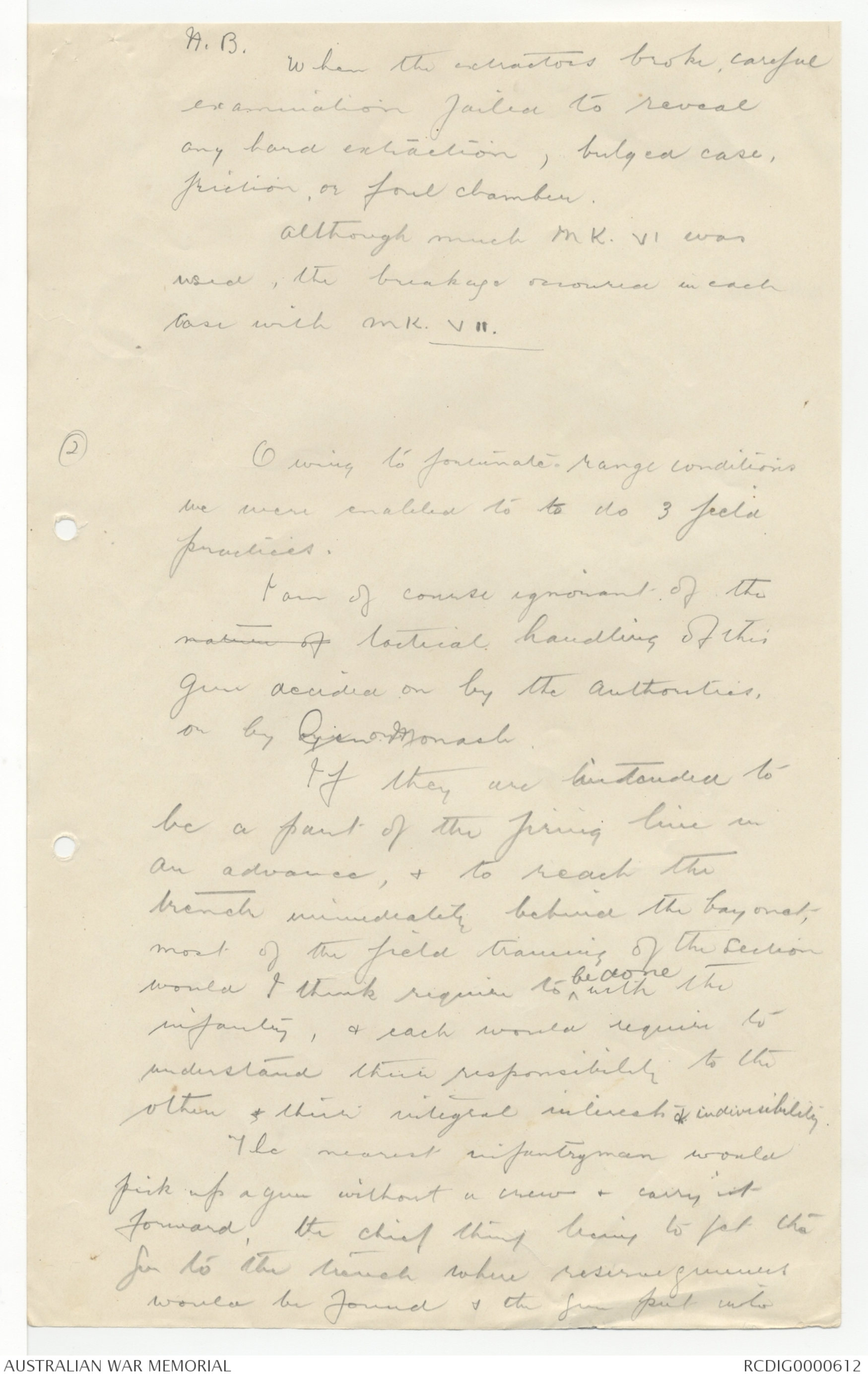
16/5/16
Conference with C.O's
Slackness of discipline
Noise after Lights out | Capt of Day
do before Reveillé.
Bugle calls in Camp
Bugle practices
Punctuality of parties - often too early.
Hot weather - parade in heat - Med. advice.
16th Bn - withdrawal of Signallers'
16/5/16
OPINION OF CONFIRMING AUTHORITY
I am of opinion that I should withhold confirmation of the finding
and sentence in this case; but before giving effect to this opinion
I refer the case for the favour of a ruling by the D.J.A.G.
The Field General Court Martial having found the accused not
guilty on the second (alternative) charge, of perjury it is unnecessary
to deal with same at any length. But in my opinion there was
nothing in the summary of evidence against Sergeant Forde to justify
the laying of such a charge. Perjury consists in swearing to that
which is known or believed to be untrue. For a man to swear "I am
not in a position to say if he was drunk or not" amounts merely to
a refusal to swear on a matter of opinion or belief.
As to the first charge, it is admitted and proved that the
words charged were used by the accused, but there is nothing to
shew that the use of the words was to the prejudice of good order
and discipline. On the contrary, two other N.C.O's entertained the
same belief as the accused, and it subsequently appeared that Capt.
Woollard A.A.M.C. "had no doubt in his own mind that he (Cpl. Cooper)
was very drunk". It cannot be to the prejudice of good order and
discipline for an N.C.O to make a statement involving an expression
of belief which appears to have been well founded and shared by
others.
On the whole merits, it is unfortunate that there should have
been a breakdown of the case against Cpl. Cooper, but this is not
the fault of the accused Sergt. Forde. In his defence he is perfectly
frank as to the reasons which actuated him in declining to repeat
an oath what he had previously stated; and those reasons disclose
no vestige of mala fides. But even if he could be held to have
committed an offence in refusing to repeat on oath his former statement,
this is an offence with which he was not charged.
BRIG-GENL.
for G.O.C. 4th. Aust. Division.
Serapeum
16/5/16.
If the Argus would like to make use of the subjoined
there can be no possible objection from the Censorship
point of view. -
John Monash.
P.S. The point of interest in the attached report, lies
only in this that our Australian public have very
little opportunity afforded to them of getting at first
hand any Knowledge of the very great work which has
been going on in the formation and training of her great
Army of Four Divisions - made up by the breaking up
of the Four Veteran Brigades, & distributing them among the
new formations. -
JM.
The Fourth Division
Upon the formation of the Fourth Australian Division
the Commander Major General Sir H. V. Cox called
together all the officers of the Division, and delivered
an address as an introduction to the War Training
of the Division. - At the conclusion of his
remarks he called upon Brigadier General Monash,
Commander of the Fourth Brigade, as the Senior Australian
Officer of the Division, to also address the gathering.
General Monash said: -
The General has asked me to add some remarks, and I feel sure
that he would desire that, in doing so, I should apply myself to
one or two themes other than those touched upon by him in the
convincing and stimulating address to which we have listened. And this I
shall endeavour to do.
In the first place, why do we, on this, as on previous occasions,
direct our appeal specially to and at the Platoon Commander? It is
not because the principles of command and leadership which have been
enunciated to you do not apply equally well to all officers, senior
and junior. It is because the Platoon Commander is the man who
stands in the most intimate contact with, and in the most direct
relationshipsxx, to, the personnel. It is because it is through him,
and by his agency, and by none other, that we can reach the man in
the ranks, and can achieve the highest fighting efficiency. It is
because the Platoon is, for all purposes, the unit for whose perfection
we strive. Because, a perfect Platoon means a perfect Battalion
and Brigade and Division; and the efficiency of an Army Corps is to
be measured by that of its Platoons. The Platoon is the compact
unit of some fifty men committed to the sole care of a single officer,
and that officer must look to it that, in all things, he fails in no
respect in his responsibility to and for those fifty men.
And in making this appeal to Platoon Commanders, for the exercise
of their highest powers and for the practice of their greatest self-
devotion. I do so with the consciousness that it is very necessary
to remind ourselves, sometimes, how great, how responsible, is the
duty which is laid upon us all. Removed as we are from the centrex
of things, living as we are, so to say, on the fringe of the Empire's
activities, in an atmosphere of monotonous war training in this
desert, and without the hourly stimulus of great and stirring happenings
among us, many of us are inclined to lose our perspective, and
to forget exactly where we stand. We do not continually realise
that we are a part of an Empire at War, and all that that means; that
we shall not achieve success unless we deserve success, and that we
shall not deserve to succeed unless we prove ourselves better men,
and show that in all things - in training - in efficiency -in military
spirit - we are more capable than our enemies. The call is upon every
one of us to put forth every ounce of effort, every fraction of those
powers and abilities with which the whole of our past work, our
education, our training and all the experiences of our lives have
endowered us. We have to realise that we are bound, in honor, to
apply to the work now in our hands nothing less than the utmost
powers of performance and self-sacrifice of which we are capable.
And as an Australian, I make a very special appeal to Australian
officers. Do we appreciate, fully, the enormous efforts and sacrifices
which the Australian Nation has made and is making in order to
put her armies into the field - efforts and sacrifices which will
impose burdens upon her population for generations to come? We are
so far, and have been for so long, removed from our home environments
that unless we think about it, and think hard, we shall forget it.
And in forgetting it, we shall forget also that Australia has committed
the achievement of the great purpose for which these sacrifices
have been made, into the keeping of a small handful of men, a few
hundred officers, through and by whom alone her great effort can be
translated into success. Let us, the officers to whom I refer, see
to it that, in doing anything less than our very best, we do not
prove false to this great trust.
I should like to refer but from a different point of view, to one
of the foremost duties of an officer to which allusion has been made
in the General's address, namely the enforcement of orders, and the
insistence upon strict compliance with all instructions. In my daily
2
inspections of the training in my own Brigade, one of the greatest
failings in officers that I continually observe is their neglect to
correct mistakes, promptly, effectively and on the spot. This is
important not so much to ensure the doing of the correct thing, but
far more to prevent the doing of the wrong thing, and to prevent,
by the doing of it unchecked, the formation of bad and incorrect
habits of drill and behaviour. When men are training, and learning,
if errors are allowed to pass uncorrected, we are simply making our
task ever so much harder, and storing up trouble for ourselves, for,
every time a man does a thing the wrong way he is forming a habit of
doing it the wrong way; and before we can even begin to teach him
the right way, we shall have to commence by eradicating the bad habit
which we have ourselves allowed him to form. It is the same whether
it be a matter of drill, of handling a weapon or an instrument, or of
behaviour in camp or in the field. Training consists largely in the
patient, energetic, and thorough elimination of all that is wrong.
As a concluding theme for these remarks, I wish to say a word
specially to the younger officers, many of whom have only recently xxx
been promoted from the ranks. It is on an aspect of discipline
which concerns officers in a special degree. I refer to loyalty to
one's superiors, one's Company and Battalion Commanders, and to
higher authority generally. It is easy to be loyal to a man, when
you agree xxxxxxxxxx with him. Anybody can yield that kind of
loyalty. But it is not so easy to render loyal service to a man,
when you think he's wrong. Nevertheless, let me tell you, that the
latter is the only kind of loyalty that is worth a "hang", the only
kind that counts in the stress of war. Remember always that it is
the senior who has to shoulder all the responsibility, and the very
least you can do is to render him cheerful, willing and loyal
obedience and thorough support in all things and on all occasions,
no matter what you may think yourself. It is a high ideal, I know,
but not too high, if we intend to make good!
[*Recd 16/5/16*]
THE DUTIES OF AN OFFICER.
AN ADDRESS IN THE FIELD.
The following notes formed the foundation of an address which was lately delivered by a Senior Officer to a School for young Officers "somewhere in France."
I hope you feel that you have picked up much that will be useful to you in your responsible position as
officers... General -- has asked me to say something to you on the moral side of the duties of an
officer ... In laying before you some remarks on such a subject, I would begin by impressing on you
the great importance of your work. You must realize that, however good and skilful the disposition may be,
battles must be won by fighting; the heroism, skill and firmness of the most junior officers will have the
most far-reaching results.
You are responsible for the successful leading of your men in battle; you are responsible for their safety,
as far as this can be ensured, while gaining success in battle; you are responsible for their health, for their
comfort, for their good behaviour and discipline. Finally, and not least, you are responsible for maintaining
the honour of England, for doing all you can to ensure the security of England, and of our women and our
children after us.
To bear all these responsibilities successfully you must acquire, first, KNOWLEDGE. You must know what
to do and how to do it, in order to lead your men with success and honour, and protect them from destruction
or loss, which will be suffered if you are ignorant of your work and of your profession. ...Secondly,
you must acquire CHARACTER - that is, resolution, self-confidence, self-sacrifice- in order to inspire your
men by your example, sustain their courage in danger by your example, and their endurance in hardship by
your example.
Now as regards the first-KNOWLEDGE - remember two things. ... (1) Knowledge is not a Heaven-sent
gift; it is the outcome of study, hard work, and thought. (2) It is an absolute necessity to you as an
officer. It is the foundation of your own character, for without it you cannot gain
self-confidence. You must
know your job. If you do not you can have no confidence in yourself, and the men can, and will, have no
confidence in you either. Knowledge is therefore the first great essential for your capacity to command your
men. ... The men must have confidence in their officer. They must feel not only that he knows his
job, but also that he will set the example of courage, self-sacrifice, and cheerfulness, and that he will look
after their welfare and comfort. It was to help you to this that these tactical schools have been started.
Now as regards the second requirement of an officer - CHARACTER. ... The character of the officer
is the foundation on the discipline of his men. Men can only be commanded successfully by men. No troops
ever possessed a discipline that was worth a damn - that could stand the great disintegrating strain of battle
- who were commanded by weak, slow, irresolute "Old Women." "Old Women" are not confined to persons
who wear petticoats; nor to persons over 70 years of age. I have met "Old Women" in trousers, and of any
age between 20 and 50. ... DON'T be an "Old Woman" whatever else you may be.
DISCIPLINE. - The creation of Discipline and the maintenance of Discipline are among your most important
duties. Your orders, and the orders given by your N.C.O's., must always be obeyed without hesitation, with
energy and with cheerfulness. Never pass any lapse from duty, however trivial, without taking notice of it.
Drop hard on to slackness, disobedience, slovenliness. Never stand any rot or nonsense. Insist on great
cleanliness, on great alertness, quickness, and cheerfulness.
I don't want you to go away, however, with the idea that the men must be treated like dogs - very far
from it. You don't want to curse or damn every time you notice things wrong. Sometimes a word of encouragement,
or a patient listening to an explanation, or a smile when pointing out the fault will go a long way.
Remember that, though we are officers and the men are privates, still we are all comrades in the great0
dangers and the great struggle; make the men feel that you realize this comradeship and love it.
But you cannot be too particular in insisting on a smart, alert, cheerful appearance, and on the prompt
and willing accordance of all honours and salutes. It is only that Company or that Battalion which shows
attention to all this which really does possess discipline. Without discipline, no body of men will stand an
hour of real danger.... These matters of appearance and respect to officers are not eye-wash. They
are the outward and visible sign of the inward and spiritual grace, as the parson says!
THE OFFICERS' LOOKING-GLASS. - The Company or the Battalion is the best looking-glass of its officers.
In the Company and the Battalion you see the image of the officers - you see yourselves. When you note a
Company on the march - slack-looking, miserable, dirty, slow, and almost sulky in coming to attention, with
half a dozen stragglers creeping on behind, and the officers and N.C.O's taking no notice - you can tell at once
that these are bad officers, and that no discipline and no energy exist there. On the contrary, when you see
a Company marching well closed-up - men with heads erect (even though covered with mud of trenches), and
quick and energetic in the movements as they come to the salute - these show good officers and a well-disciplined
Company.... When you take your men into action, either in ordinary trench warfare or in
a big attack, all this discipline will repay you and your men themselves a thousandfold.
Keep up your own energy and that of your men, and maintain the offensive spirit most
carefully....
To do this, don't overlook the fact that one of your chief duties is to be always thinking. You have got brains;
don't forget to use them. That is what you are an officer for.... You must always be thinking. How
can you make the trench (or your position wherever it is) more secure, or more comfortable for the men? Or
how can you attack the enemy? Or inflict some blow or loss on him? As soon as the thought has entered
your head, put it into execution; issue the necessary orders and see them energetically carried out. Thus
you will keep up the spirit of Energy and of the Offensive which are of such immense importance.... All
energy is born of thought; therefore remember that to think is one of your great duties.
Try and carry out these principles, and put the knowledge you have acquired here into execution when
you return to your Battallion. Do not overlook the fact that - though you must possess (and show that you
possess) decision and resolution in order to instil discipline into your men - merely to insist on obedience,
smartness, and compliance with all orders is not sufficient. Do not forget that the men are your comrades;
and do not overlook the fact that the British soldier has a great soul, and can and does appreciate what courage,
honour, patriotism, and self-sacrifice mean.... Talk to your men often on these great qualities, both in
lectures and to individuals personally. You will always find a ready response, which will one day stand you
in good stead; and, what is more important still, will stand England and the Empire in good stead.
17/5/16
General Cox
Casino Palace Hotel
Port Said
Lt Colonel Dare's marriage takes place 1130 tomorrow at
Protestant Church Ismailia. -
Monash
SC 2061219
1210
19/5/16
Tweedie S/Sgt
RESULTS OF EXAMINATION HELD BY 4th BRIGADE SCHOOL IN LEWIS MACHINE GUN. MAY 1916
| REGTL NO. |
RANK. |
NAME. |
UNIT. |
DRILL. |
STRIPPING. |
GENERAL DESCRIPTION MECHANISM |
STOPPAGES |
NO OF MARKS |
PASSED AS INSTRUCTORS. |
FAILED AS INSTRUCTORS. PASSED AS GUNNER AND MECHANIC |
| 13th Battalion. | 13th. | |||||||||
| Lieutenant | Walsach. | 13th. | E | 2 | E | 1 | 85 | P | ||
| 3108 | Corporal | Porteous. | 13th. | 1 | 2 | 2 | 1 | 70 | P | |
| 1784 | Private | McLennon | 13th. | 1 | 1 | 2 | 1 | 75 | P | |
| 3144 | " | BWallbank | 13th. | 1 | 2 | 2 | 2 | 65 | P | |
| 1413 | " | Thompson. H. | 13th. | 1 | 2 | 3 | 2 | 50 | FAILED | P |
| 222 | " | Thompson. G.A. | 13th. | 1 | 2 | 1 | 1 | 75 | P | |
| 3097 | " | McPhail. | 13th. | 1 | 2 | 1 | 2 | 70 | P | |
| 360 | " | Corish. | 13th. | 1 | 1 | 2 | 1 | 75 | P | |
| 14th Battalion. | ||||||||||
| Lieutenant. | Cole. C.R.T. | 14th. | 1 | 1 | E | E | 90 | P | ||
| 1228 | L/Corporal | Antill. | 14th. | 1 | 1 | 1 | 1 | 80 | P | |
| 1256 | L/Corporal | Farnback. | 14th. | 1 | 2 | 1 | 1 | 75 | P | |
| 2054 | Private | Buckman. | 14th. | 1 | 1 | 1 | 1 | 80 | P | |
| 422 | L/Corporal | Brasch. | 14th. | 1 | 1 | E | 1 | 85 | P | |
| 3303 | Private | Dickson. | 14th. | 1 | 2 | 1 | 1 | 75 | P | |
| 658 | Private. | Smith. W.A. | 14th. | 1 | 1 | 1 | 1 | 80 | P | |
| 109 | Private. | Perry. H. | 14th. | 1 | 2 | 1 | 1 | 75 | P | |
| 15th Battalion. | ||||||||||
| Lieutenant | McIntosh. | 15th. | 1 | E | E | 90 | P | |||
| 2722 | Lieutenant | Aberry. | 15th. | 1 | 1 | 1 | 1 | 80 | P | |
| 86 | Private | Chevelling. | 15th. | 1 | 1 | 1 | 1 | 80 | P | |
| 2388 | " | Leslie. | 15th. | 1 | 1 | 1 | 1 | 80 | P | |
| 172 | " | Murdock. | 15th. | 1 | 1 | E | 1 | 85 | P | |
| 2698 | " | Wilson. | 15th. | 1 | 1 | 1 | 1 | 80 | P | |
| 3614 | " | Lambert. | 15th. | 1 | 1 | 1 | 1 | 80 | P | |
| 2431 | " | Crowther. | 15th. | 1 | 1 | 1 | 1 | 80 | P | |
| 16th Battalion. | ||||||||||
| Lieutenant. | Potts. | 16th. | 1 | E | E | 1 | 90 | P | ||
| 1353 | Segeant. | Miller. E.J. | 16th. | 1 | 1 | 1 | 1 | 80 | P | |
| 2226 | Corporal | Holland. E. | 16th. | 1 | 2 | 2 | 1 | 70 | P | |
| 157 | Private | Wilson. H.P. | 16th. | 1 | 3 | 2 | 1 | 55 | P | |
| 3839 | " | Turner. C.H. | 16th. | 1 | 1 | 1 | 1 | 80 | P | |
| 1351 | " | Dowling. A.J. | 16th. | 1 | 1 | 2 | 1 | 75 | P | |
| 1427 | " | Spang. H.H. | 16th. | 1 | 1 | 2 | 1 | 75 | P | |
| 3508 | " | Lester. T.P. | 16th. | 1 | 1 | 1 | 1 | 80 | P | |
N.B.
'E' Excellent 25 marks (possible 100)
'1' Very Good 20 "
2 Good 15 "
3 Fail nil "
1
17/5/16
From Capt. B. Teasdale Smith
To Brigade Major
I herewith beg to submit my report.
(1) I wish to draw attention to the
following breakages which I consider
unusual for the amount of firing -
2500 rounds per gun.
13th Bn 3 broken extractors
14 Bn 2 broken extractors
15 Bn 1 broken extractors
2 weakened extractors
I have noticed that much of the
mark VII ammunition has a thickened
rim, & I am inclined to think that
with many extractors the tempering
of the spring steel of the extractors is
at fault.
Unless spare parts are
supplied from a base in France,
the guns would soon be useless
as only 4 extractors (spare) are
supplied with each Lewis Gun
making in total of 6.
A recommendation that certain
parts that we found to be weakest
are supplied to ordinance for issue
would meet it in case.
N.B.
When the extractors broke, careful
examination failed to reveal
any hard extraction, bulged case,
friction, or foul chamber.
Although much MK. VI was
used, the breakage occoured in each
case with MK.VII.
(2) Owing to fortunate range conditions
we were enabled to to do 3 field
practices.
I am of course ignorant of the
nature of tactical handling of this
gun decided on by the authorities,
or by Gen Monash.
If they are intended to
be a part of the firing line in
an advance, & to reach the
trench immediately behind the bayonet,
most of the field training of the section
would I think require to ^ be done with the
infantry, & each would require to
understand their responsibility to the
other their integral interests & indivisibility.
The mearest infantryman would
pick up a gun without a crew and carry it
forward, the chief thing being to get the
gun to the trench where reserve gunners
would be found & the gun put into
 Transcriber 6897
Transcriber 6897This transcription item is now locked to you for editing. To release the lock either Save your changes or Cancel.
This lock will be automatically released after 60 minutes of inactivity.